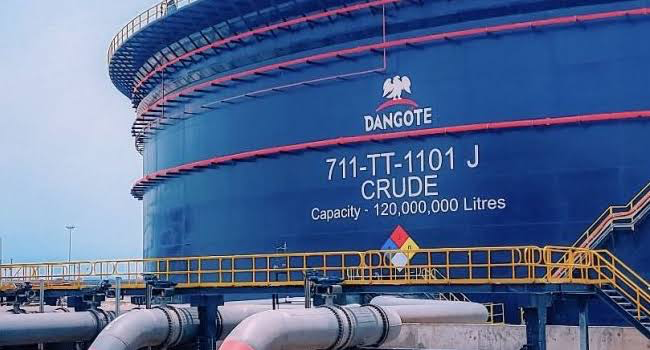The management of Dangote Petroleum Refinery has called on the Nigerian Upstream Petroleum Regulatory Commission (NUPRC) to enforce the domestic crude supply obligation as outlined in the Petroleum Industry Act (PIA). This appeal comes as the refinery struggles to secure sufficient crude oil to optimize its operations, despite previous allocations.
Dangote Petroleum Refinery, a significant player in Nigeria’s energy sector, has emphasized the need for local refineries to purchase crude oil directly from Nigerian producers rather than relying on international middlemen. This approach is in line with the PIA, which aims to streamline the process and reduce dependency on foreign intermediaries. However, the refinery management has expressed concerns that this provision of the PIA is not being fully enforced.
In a statement released by Anthony Chiejina, the spokesperson for Dangote Group, the company acknowledged a recent announcement by the NUPRC regarding the allocation of 29 million barrels of crude oil to Dangote Petroleum Refinery and Petrochemicals. While the refinery expressed gratitude for this allocation, it also noted that the actual delivery of these cargoes is yet to occur.
Chiejina explained that, apart from the term supply agreements that the refinery had bilaterally negotiated with the Nigerian National Petroleum Corporation Limited (NNPCL), only one crude cargo had been facilitated by the NUPRC from a domestic producer. The remaining crude processed by the refinery had been purchased from international traders, a situation the refinery seeks to change.
Chiejina stated, “All we are asking for is for refineries in Nigeria to buy crude directly from the companies that produce it in Nigeria rather than from international middlemen. This is specified in the PIA. Unfortunately, the NUPRC has effectively admitted in their statement that they will be unable to enforce the domestic crude supply obligation as specified in the PIA, citing the ‘sanctity of contracts’ as an excuse.”
The management of Dangote Petroleum Refinery has repeatedly stressed that it is not receiving the full crude supply necessary to operate at maximum capacity. This situation has led to increased costs for the refinery, as it often has to purchase Nigerian crude from international traders at a premium.
Chiejina clarified that the refinery had never accused the NNPCL of failing to supply crude. Instead, their concern lies with the NUPRC’s reluctance to enforce the PIA’s domestic crude supply obligation. This enforcement is critical for the refinery to receive its full crude requirement from both NNPCL and international oil companies (IOCs) operating in Nigeria.
“For September, our requirement is 15 cargoes, of which NNPC allocated six. Despite appealing to NUPRC, we’ve been unable to secure the remaining cargoes. When we approached IOCs producing in Nigeria, they redirected us to their international trading arms or responded that their cargoes were committed,” Chiejina explained.
This issue has significant financial implications for the refinery. As Chiejina noted, the refinery often has to purchase the same Nigerian crude from international traders at an additional premium of $3 to $4 per barrel. This premium translates to an additional $3 million to $4 million per cargo, a cost that the refinery believes could be avoided if the PIA were fully enforced.
The management of Dangote Petroleum Refinery has called on the NUPRC to take a more proactive role in ensuring that the domestic crude supply obligation is met. They argue that the current situation not only hinders the intent of the PIA but also places an unnecessary financial burden on local refineries.



